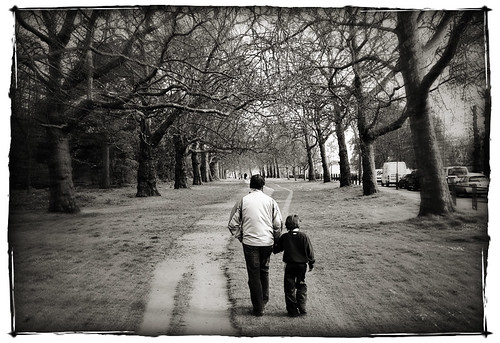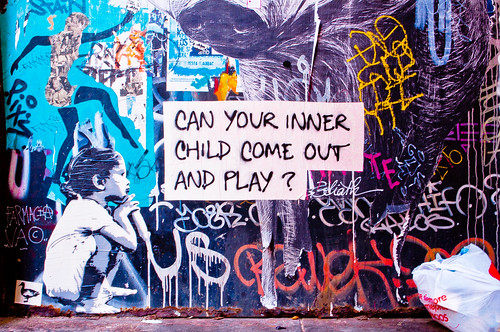This is cross-posted from Grow Boys Red Deer at http://www.reddeergrowboys.ca/. I have been involved with the Grow Boys project for three years now, and it has been one of the most rewarding initiatives I have taken on. For more information on the Grow Boys concept, please get in touch and we can talk.
My father used to play with my brother and me in the yard.
Herbert Vilakazi's opening address to the National Association of Child Care Workers 1991 Biennial Conference (http://tinyurl.com/yfxzdwn) in South Africa provides one such perspective with his brilliant insight to how we need to think and act if we are to support today's children as our gifts to the future.
Building our approach on the hope wheel model, and understanding that the integrative nature of combining contemporary with traditional spheres of wisdom, allows us the largest capacity to package our 'gifts to the future' well enough so the promises of our boys will be fully realized. The good people within our community that work with boys every day are the doors that need to be opened to both contemporary and traditional approaches to supporting boys specifically. The answers are within us. We are the peasant culture Vilakazi refers to; the grassroots, community-based core of caregivers so critical to setting a solid base for our boys, and through our connection to contemporary practice and research into positive child development, we are also the access points to innovative and effective science-based interventions.
By taking two or more perspectives on effective and positive child development and combining their best elements into a synthesized hybrid of all of them, a new paradigm is born, and those who brought each perspective to the process no longer operate independently and in defense of their point of view, but rather interdependently in support of each other and the best possible course of action. Grow Boys calls this 360 degrees of support, and it can be applied in any community when the father of the child shall be every man as old as the child's father, and the mother of the child shall be every woman as old as the child's mother; a society of adults that truly cares for children and understands what their happy, healthy growth and development means to us all from a species perspective.
My father used to play with my brother and me in the yard.
Mother would come out and say,
"You're tearing up the grass!"
"We're not raising grass," Dad would reply.
"We're raising boys." -author unknown
We
are raising boys. All of us. No matter who we are in the community,
whether we are a parent or not; we all have a responsibility to support
the happy, healthy growth and development of boys. Of course we need to
do this for girls as well, but Grow Boys is a collective that focuses
specifically on what can be done to nurture the particular needs of
boys; and there are many. As the dad in the poem suggests, we need to
take a critical and reflective perspective toward what our boys need
from us, and how we're going to provide for them.
Herbert Vilakazi's opening address to the National Association of Child Care Workers 1991 Biennial Conference (http://tinyurl.com/yfxzdwn) in South Africa provides one such perspective with his brilliant insight to how we need to think and act if we are to support today's children as our gifts to the future.
"The problems of children and of youth, giving rise to child and youth care programs, can only begin to be solved in that society of humankind’s dream; a more collective-oriented society than at present, when the father of the child shall be every man as old as the child’s father; when the mother of the child shall be every woman as old as the child’s mother; a society of responsibility of the entire community; a society without poverty; without the inequalities of society members, based upon race, class, or sex; a society without the use of violence against other members of society; a society without any exploitation and oppression of any group by any other group; a society of equals; a thoroughly democratic society; last, but not least a society that shall have, once more, incorporated productive labor into the educational process."
We cannot know where the next Beethoven, Einstein or Mother Teresa will come from. Great things are possible, and probable as human history has proven. Educators today need to support children's natural curiosity and spirit to learn in ways that don't stifle or restrict their potential to do these great things. The world we know is changing, and it always has, but not at the rate or in the manner we are witnessing today. Today, in the midst of what amounts to a perfect storm within the
social, political, geographical, technological and economic realms of
the new global society, transformational change is inevitable. To deny
this would be ridiculous. To deny that we as citizens of the emerging
global society must be proactive to ensure the transformation is
managed effectively, and results in an improved society, would be even
more ridiculous. The notion that children are the most important factor in this transformational future is undeniable. It is from the minds and souls of children that every future discovery, every idea, every solution and all hope will come. Grow Boys is focused on
divining ways to ensure happy, healthy boys are ready for the challenge
as they grow and develop in mind, body and spirit.
Within his 1991 address, Professor Vilakazi touched on what I believe to
be the key to managing the effective and purposeful transformation of our world. With respect to
the issue of caring for children he states that,
We are not further along, than peasant culture, in our knowledge of child psychology. What we should do, in our efforts to increase and improve our knowledge of child psychology, is not only to study what our specialists child psychologists have written, but also to go out to learn, and collect, and record, and collate carefully, the psychological and psychoanalytic theory of childhood contained in peasant cultures, and to integrate or synthesize the two. This applies to all spheres of knowledge.
Vilakazi is susggesting that there is
contemporary wisdom to be
gained through modern scientific processes that helps us develop insight
maximizing support for
children, but also that there exists timeless wisdom yet to be fully
acknowledged by contemporaries about how caregivers have effectively
supported children since the beginning of mankind. This is the essence
of Grow Boys. Based on a learning model that has endured millenniums,
our hope wheel is the platform from which we work that helps us assess where our boys are on their learning journeys, and what they need from us to continue moving forward.
Building our approach on the hope wheel model, and understanding that the integrative nature of combining contemporary with traditional spheres of wisdom, allows us the largest capacity to package our 'gifts to the future' well enough so the promises of our boys will be fully realized. The good people within our community that work with boys every day are the doors that need to be opened to both contemporary and traditional approaches to supporting boys specifically. The answers are within us. We are the peasant culture Vilakazi refers to; the grassroots, community-based core of caregivers so critical to setting a solid base for our boys, and through our connection to contemporary practice and research into positive child development, we are also the access points to innovative and effective science-based interventions.
By taking two or more perspectives on effective and positive child development and combining their best elements into a synthesized hybrid of all of them, a new paradigm is born, and those who brought each perspective to the process no longer operate independently and in defense of their point of view, but rather interdependently in support of each other and the best possible course of action. Grow Boys calls this 360 degrees of support, and it can be applied in any community when the father of the child shall be every man as old as the child's father, and the mother of the child shall be every woman as old as the child's mother; a society of adults that truly cares for children and understands what their happy, healthy growth and development means to us all from a species perspective.
Grow
Boys believes that our children will be best prepared for the
future when we all share the responsibility to move to an
interdependent and proactive
paradigm of child development that acknowledges and celebrates diverse
thoughts and theories no matter where, and from what point in history
they originate.





No comments:
Post a Comment